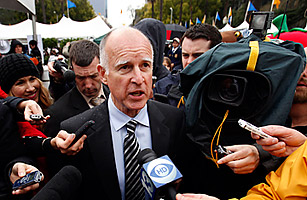
Like his predecessor, Arnold Schwarzenegger, California Governor Jerry Brown is struggling to keep the state afloat in an ocean of red ink. Facing a $26 billion deficit, he warns of “draconian” cuts to education and public safety if the state cannot raise revenue and has to adopt an all-cuts budget. Brown, 72, a Democrat famous for austerity and Buddhist simplicity, would prefer not to go there — but his attempts to court enough Republican support to smooth the way have just come to an abrupt end.
In January, Brown proposed steep cuts in virtually all state services; and last week, he signed bipartisan bills trimming $11.2 billion from the massive deficit. Of that sum, nearly $6 billion is from health and social programs that serve the poor, the sick, the elderly and children. The University of California is taking a $500 million hit as is the massive 23-campus California State University system.
But that’s not enough. Brown needs to shore up tax revenues, specifically by extending the tax rates set to expire in June. And that’s where Brown has run into the same so-far unsolvable California conundrum that has stymied governors again and again. California is one of a handful of states where tax increases — including the extension of tax rates — must be approved by a two-thirds vote of the Legislature. This gives the minority Republicans tremendous leverage. To try to get around this knot, Brown has been pursuing a populist strategy. When he was running for office, Brown vowed not to raise taxes without voter approval and for three months he worked behind-closed doors to court Republican support for a June vote on the tax extension.
The Republicans weren’t about to let themselves be forced into a corner by popular demand — without getting the deeper cuts they want from the budget. And so, in exchange for their support of the governor’s budget plan and placing the tax extension measure on the June ballot, Republican leaders pushed for pension reform, a spending cap and business-friendly regulatory changes. Last week, they increased their demands, handing Brown an expanded list of 53 items, including changes to teacher tenure, curbs on trial attorney fees and limiting the tax extensions to 18 months and not the five years proposed by Brown.
Those demand were too much for Brown. On Tuesday, he declared the budget talks dead and halted negotiations with Republicans over a deal to place taxes on the June ballot to resolve the state’s remaining $15.4 billion budget shortfall. Said the Governor: “The budget plan that I put forth is balanced between deep cuts and extensions of currently existing taxes and I believe it is in the best interest of California. Each and every Republican legislator I’ve spoken to believes that voters should not have this right to vote unless I agree to an ever changing list of collateral demands.” Brown needed at least four Republican votes to put the measure on the ballot. He did not specify what he would do next.
“The crisis is real,” says Jack Pitney of Claremont McKenna College. “If Brown doesn’t get something on the ballot, he has to go the route of austerity with an all-cuts budget.” Apart from the Republicans, Brown is boxed in by the unions and Democrats who did now want to see him to giving in to G.O.P. demands. Meanwhile, the calendar is moving rapidly. “Brown sold himself as the old wiley guy, a pragmatic fixer,” says Republican consultant Rob Stutzman. “Now the pressure is on.” Without the special election, it is growing more likely that deeper cuts will have to be made — perhaps piercing straight to the bone. And it may be a bipartisan crisis. “An all-cuts budget is going to be unpopular,” says Pitney. “I don’t see an upside for Republicans who say they want smaller government.”